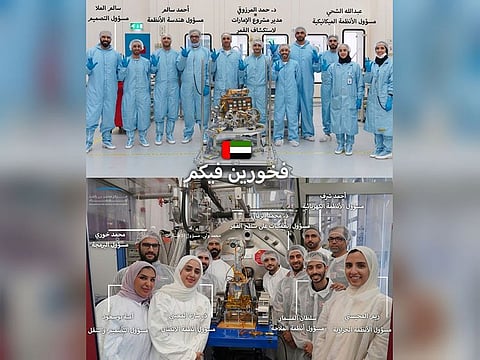UAE: Meet the team working on Rashid 2 moon rover
Mohammed Bin Rashid Space Centre has started work on new explorer to reach the moon

Dubai: The Mohammed Bin Rashid Space Centre in Dubai has announced it has started working on Rashid 2 rover to reach the moon.
It follows the loss of communication with the Japanese lander spacecraft carrying the first Rashid Rover moments before touch down on the moon on Tuesday.
The Centre has pledged that the team will continue to live by the words of His Highness Sheikh Mohammed bin Rashid Al Maktoum, Vice President and Prime Minister of the UAE and Ruler of Dubai, and under the guidance of his leadership.
Rashid 2 team members
• Abdullah Al Shehhi, Mechanical Systems Officer, • Hamad Al Marzouki, Director of the Emirates Moon Exploration Project, • Ahmed Salem, Systems Engineering Officer, • Salem Al Mulla, Design Officer, • Ahmed Sharaf, Electrical Systems Officer, • Dr Mohammad Al Zaabi, responsible for operations on the moon, • Mohammad Wali, responsible for tests, • Mohammad Khoury, Programming Officer, • Sarah Al Muaini, Communications Systems Officer, • Amna Busoud, Design and Mobility Officer, • Reem Al Muhaisni, Thermal Systems Officer, • Sultan Al Mismar, Navigation Systems Officer.
Yesterday, the Ruler of Dubai announced the launch of Rashid 2, a new Emirati lunar mission that will be undertaken by the Mohammed bin Rashid Space Centre.
First Arab lunar mission
Through the Emirates Lunar Mission, MBRSC accomplished its ambitious goal of designing and building the world’s most compact rover and becoming the first Emirati and Arab rover to reach the lunar orbit before the landing attempt onboard iSpace’s HAKUTO-R lander. These achievements are momentous for a nation’s first lunar mission and highlight the UAE’s commitment to advancing space exploration.
The Rashid Rover, integrated into iSpace’s HAKUTO-R lander, successfully lifted off atop a SpaceX Falcon 9 rocket on 11th December at 11:38 UAE time from Space Launch Complex 40 (SLC-40) at Cape Canaveral Space Force, Florida. The ELM marked the first Emirati lunar mission, making the UAE the first Arab country to ascend toward the lunar surface.
Rashid Rover was built to traverse and explore the Moon’s surface with a unique configuration. Weighing about 10 kilograms, the Rover is around 80 centimetres high, around 53.5 centimetres long, and close to 53.85 centimetres wide.
MBRSC partnered with 10 international and four UAE-based entities for the Emirates Lunar Mission’s science programme. In collaboration with close to 40 scientists and researchers, MBRSC developed the main instruments, the optical cameras, microscopic imager and Langmuir probe on board the Rashid Rover.



